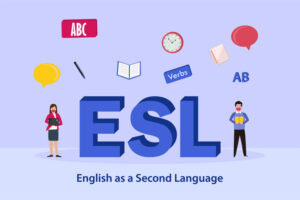 English is the most spoken language in the world. But fascinatingly, most of the people who know it didn’t learn it as their first language. While there are one and a half billion English speakers in the world, only around 380 million learned it as their native language.
English is the most spoken language in the world. But fascinatingly, most of the people who know it didn’t learn it as their first language. While there are one and a half billion English speakers in the world, only around 380 million learned it as their native language.
The rest relied on really good English teachers to help them learn it. And most of those teachers only knew how to help because they hold a bachelor’s degree in ESL and specialized training in teaching English as a second language (TESL).
A bachelor’s in ESL is an excellent investment in a career path with surprisingly broad opportunities, and one with more variety and cultural engagement than most teachers ever experience.
- Liberty University Offers Undergrad Cert and B.Ed. in English as a Second Language.
- The Grand Canyon University offers a Masters of Arts in Teaching English to Speakers of Other Languages (TESOL) Program and a B.A. in Secondary Education.
- Arizona State University - Online Offers Teachers of English to Speakers of Other Languages, MTESOL
- Campbellsville University Offers an ESL Endorsement (P-12).
- St. John's University Offers a Ph.D. in Literacy: Teaching English to Speakers of Other Languages (TESOL)
What Is a Bachelor’s Degree in ESL?
A bachelor’s degree is the standard four-year course of study that is the modern baseline for professional employment in the United States. Maybe even more importantly, it’s a key piece of getting a teaching license in every state.
Bachelor’s programs are often characterized as being a BS (Bachelor of Science) or BA (Bachelor of Arts), and in the education world, sometimes as a BEd (Bachelor of Education). You can find TESL (Teaching English as a Second Language) in all three of those flavors, depending on the school.
So what is the difference?
Arts degrees are considered to be firmly in the traditional liberal arts mold of college studies. They convey a lot of focused technical detail within the major, but also balance it out with a significant amount of coursework in more general knowledge in the arts and sciences. They offer a background with more contextual depth for your major, building your critical thinking, problem-solving, and communications skills alongside your professional abilities.
At some universities, these degrees are structured as Bachelor of Arts in Linguistics with a TESL focus.
A Bachelor of Science still includes some liberal arts coursework but leans more into the technical side of your major. For a TESL degree, that can mean more focus on theoretical aspects of language acquisition, linguistics, and information theory.
A Bachelor of Education, finally, is still more focused, not just on TESL, but on the practical applications of TESL skills. A BEd is focused on educator preparation, so it’s filled with the kind of coursework that prepares teachers for a life in the classroom. That means classroom management and educational leadership skills, lesson planning, and curriculum development.
Commonly, a BEd can be expected to include any coursework required for teaching licensure in the state in which it is offered. That includes the crucial student teaching experiences that are required to build your hands-on expertise in delivering ESL instruction in the classroom. BA or BS TESL degrees can go either way.
Turning a Bachelor of Arts in English Into TESL Expertise
 Although the name is very similar, a BA in English or English Language Studies with a teaching concentration doesn’t by itself qualify you to teach the language to speakers of other languages. Instead, those degrees are aimed at qualifying students to become English teachers in typical American classrooms. They don’t cover the special skills needed to deal with non-native speakers.
Although the name is very similar, a BA in English or English Language Studies with a teaching concentration doesn’t by itself qualify you to teach the language to speakers of other languages. Instead, those degrees are aimed at qualifying students to become English teachers in typical American classrooms. They don’t cover the special skills needed to deal with non-native speakers.
But with the core elements of instructional education and a solid understanding of the composition and structure of English itself, you are a lot closer to that goal than most college graduates.
Because actual bachelor’s in ESL teaching programs aren’t all that common, it’s actually quite common for English teachers to get their bachelor’s in English or teaching and then pick up the specialist training they need through a TESOL certificate program.
Many colleges offer these short certificate programs online. In less than a year, you pick up the extra skillset you need to deal confidently with non-native speakers and bridge the gap to English fluency.
What Can You Do With a Bachelor’s Degree in ESL Teaching?
 The Bachelor’s in ESL Teaching is the rare degree that is entirely clear about the job prospects it offers right on the label: you’re going to graduate with the qualifications to be an ESL teacher. That’s it!
The Bachelor’s in ESL Teaching is the rare degree that is entirely clear about the job prospects it offers right on the label: you’re going to graduate with the qualifications to be an ESL teacher. That’s it!
It’s an extremely focused set of skills that, unlike, say, a BS in psychology, it doesn’t offer a wide range of different industries and positions to explore. You’re going to be teaching people how to speak English—that’s the gig.
ESL teachers have job opportunities that other educators only dream of.
However, it’s a gig that comes with a great deal of potential for both traditional and non-traditional teaching. You’ll be perfectly qualified to step into a conventional public school teaching position in almost any state in the country, with all the benefits, time-off, community respect, and union protections those jobs come with. But you’ll also have opportunities that most teachers never get to take your skills on the road and teach English in exotic places around the world… all while getting paid for the privilege.
And, of course, a bachelor’s also puts you in a position to advance your education even further at any time through a master’s degree in ESL.
Positions for ESL Bachelor’s Graduates Can Take You Down the Block or Around the World
ESL teacher careers can range from working for elite private schools around the world where the wealthy pay top dollar to have their children taught impeccable English, to jobs for private companies that specialize in adult ESL for corporate staff who need to engage with English-speaking counterparts overseas. There is also a healthy amount of room for independent tutoring, either in person or online, from a wide range of private students.
There are even foreign governments that hire people with ESL teaching degrees to help develop a curriculum in public schools where English training is considered vital to the success of the workforce.
Still, although they may spend some time working overseas at some point in their career, most ESL teachers who earn bachelor’s degrees in the field are ultimately headed for the security and stability of a conventional teaching job in a U.S. school, public or private.
What Sort of Salaries Are Common for Graduates With a Bachelor’s Degree in ESL?
 Entry-level educators, which is what you will be once you graduate with your ESL bachelor’s degree, are known for enjoying stable careers with great benefits. ESL teacher salaries are respectable too, lining right up with teacher’s union negotiated salaries in place in different states.
Entry-level educators, which is what you will be once you graduate with your ESL bachelor’s degree, are known for enjoying stable careers with great benefits. ESL teacher salaries are respectable too, lining right up with teacher’s union negotiated salaries in place in different states.
One advantage that you have over other teachers is the broader range of positions available in ESL. While an elementary school teacher is pretty much stuck teaching K-6, the students ESL teachers work with can be of any age. Additionally, ESL is a relatively rare specialization… and the ranks of students who need them has continued to grow.
Adult Basic and Secondary Education and ESL Teachers earn an average of $60,560 per year as of 2023.
The diversity in the field is further reflected in where ESL teachers work. The largest single group are those employed by elementary and secondary schools, but that’s only about a third of the field. Others work for private educational services, junior colleges, or even independently. That gives you greater control over your salary—and working environment—than most teachers enjoy.
Over time, it’s entirely possible to work your way up to a salary in the top ten percent of the profession: more than $97,980 per year. That’s not half bad for spending your days imparting the ability to speak a language you’ve been speaking your whole life!
Bachelor’s Degrees in ESL Come With a Complete Curriculum in Instruction
 There’s an assumption among many people that anyone who can speak English can teach it. But that’s wrong on two counts, both of which are addressed in the curriculum plan for an ESL bachelor’s program.
There’s an assumption among many people that anyone who can speak English can teach it. But that’s wrong on two counts, both of which are addressed in the curriculum plan for an ESL bachelor’s program.
First, while native speakers have an innate understanding of the language, they can’t break it down and reconstruct it the way that new learners need to have done. So your curriculum will come with classes that unpack English and language for you such as:
- English Language Arts Methods and Lab
- Early Literacy and Linguistics
- Foundations of ESL Teaching
- Understanding Second Language Acquisition
They give you the theory of language and the details of English itself that you never knew you were missing.
Then there is the education side. Teaching is a profession, a set of skills that most people don’t have a good grasp of. You’ll hone those as well through classes like:
- Human Relations for Teachers
- Child & Adolescent Psychology
- The Teaching and Learning Process
- Teaching of Literacy
- Assessment in TESL
Finally, in programs that lead to state licensure, there are even more practical and required courses in education and teaching, such as Classroom Management Theories and Practices, Professional Development, and Student Teaching in TESL. These give you the specific mandatory skills it will take to get through your testing, practical experience, and finally licensing requirements for teaching.
One of the great things about a bachelor’s degree is that with four years and 120 credits to burn, you will have plenty of room for elective courses on top of your required classwork. You’re free to fill those up from all kinds of different buckets, from history to arts and social studies.
For a future ESL teacher, this is pure gold. As someone who will soon specialize in working with students coming from backgrounds that are, by definition, diverse and unfamiliar, you can prepare yourself with studies that unpack some of those mysteries. Studying world history, other languages, or cultural connections can all be invaluable in making you a better teacher of English.
Certification for Licensure Is a Major Consideration for ESL Bachelor’s Students
 It’s important to understand teacher certification and licensing in your state, because your bachelor’s in ESL can have everything to do with whether or not you will qualify to teach in public, and in some cases private, classrooms.
It’s important to understand teacher certification and licensing in your state, because your bachelor’s in ESL can have everything to do with whether or not you will qualify to teach in public, and in some cases private, classrooms.
Each state regulates teacher licensing as a necessary safeguard on ensuring professionalism among those entrusted with educating tomorrow’s workers, leaders, and artists. The certification process for a teacher’s license and ESL endorsement requires that you take certain mandatory coursework and undergo specific on-the-job training in the form of student teaching.
Because state licensing requirements are different, your school may have different types of certifications for different grade levels of instruction—make sure you are pursuing the right path!
Some bachelor’s in ESL programs build in this important combination of training. But because ESL is also a lucrative profession that can involve adult learners or jobs in countries with less stringent requirements, not all ESL degrees are designed to lead to certification.
It’s never going to hurt you to pick an ESL bachelor’s leading to teaching certification in your state, although you may spend quite a lot of time in classes you don’t need. But if you pick a program that doesn’t lead to certification, you may have to go back to get a certificate that will qualify you as a teacher.
How To Pick the Right School for Earning Your ESL Bachelor’s Degree
Most of your considerations in choosing a school to earn your bachelor’s degree in ESL will revolve around certification considerations.
Because teacher certification is handled state-by-state, even schools that offer the right coursework for licensing are usually set up only to meet requirements where they are located. It’s almost always possible to still become licensed in another state, but you often have to jump through extra hoops to do it.
In some cases, particularly in the East where state lines are squashed together, you may find schools in border areas that seek to meet requirements for nearby states as well.
It’s also true that there simply aren’t as many schools offering this degree specialty as other common teacher preparation courses. So your selection, apart from online degrees, may be limited.
Still, you want to find the best possible match for your interests and goals as you can. So you’ll want to look at factors like:
- Faculty – The background and credentials of the instructors you will be learning from should include both strong academic chops as well as subject-matter expertise in ESL.
- Research programs – Teaching is a field that is constantly experimenting and improving methods, so a school that is active in forging new ground will equip you better for a forward-facing career.
- Community connections – The best way to test and hone what you learn in an ESL degree is by practicing on real students. Colleges with strong ties to local educational and community organizations, particularly those with a high population of ELL students, have more to offer.
- Resources and support – From getting your teaching license to getting your first job, the best colleges come with both academic counseling and post-graduate career support to make sure you get the kind of job you are looking for.
- Accreditation – Anyone looking for an education that results in licensure will want to make sure the school they attend holds a specialty accreditation from CAEP (Council for the Accreditation of Education Preparation) or NCATE (National Council for the Accreditation of Teacher Education). These organizations ensure that teacher prep programs meet the national standards for teacher training, and are often important for ensuring the degree is accepted by your state licensing board.
What Will It Cost You To Earn a Bachelor’s Degree in ESL?
Another factor for almost everyone exploring college degrees today, of course, is that of cost. According to the National Center for Education Statistics (NCES), the average annual rate of tuition and fees at public universities for 2023 was $9,750, while private schools cost an eye-popping $35,248 per year.
Obviously, this is a big expense for someone who is planning to make teacher’s wages, and loans and other student financial assistance play a role for almost all bachelor’s in ESL students.
On the other hand, teaching is a role that is valuable to society, and you will find plenty of support both during and after your studies to help with the bills. There are many scholarship offerings aimed at future teachers. Even more valuable are a number of student loan forgiveness programs that can relieve your debt after a period of service and a number of other conditions are met.
Considering Earning a Bachelor’s Degree in ESL Teaching Online
 Earning your ESL bachelor’s degree online is one way to help keep those costs down. And, as mentioned before, it may also be your best option for finding an ESL bachelor’s degree in the first place.
Earning your ESL bachelor’s degree online is one way to help keep those costs down. And, as mentioned before, it may also be your best option for finding an ESL bachelor’s degree in the first place.
Because these programs are less common than other core teacher certification specialties like math, science, or English, online options are an important way to access expertise you might not find locally.
That broader selection is a major advantage of online options. Not only does it make them available where they might not have been before, but it makes several of them available. You are free to choose the best fit.
- Liberty University Offers Undergrad Cert and B.Ed. in English as a Second Language.
- The Grand Canyon University offers a Masters of Arts in Teaching English to Speakers of Other Languages (TESOL) Program and a B.A. in Secondary Education.
- Arizona State University - Online Offers Teachers of English to Speakers of Other Languages, MTESOL
- Campbellsville University Offers an ESL Endorsement (P-12).
- St. John's University Offers a Ph.D. in Literacy: Teaching English to Speakers of Other Languages (TESOL)
But there are plenty of reasons you might want to opt for online studies anyway. Online degrees are usually taught at least partly asynchronously. That means no fixed schedule to follow for classes. You can stream, email, chat, or collaborate with classmates at any hour thanks to web and app-based Learning Management Systems (LMS). That frees you up to keep up with your current job while you prepare for the next one, or to take care of family or personal matters.
Location independence is one of the biggest reasons people opt for online programs, however. Avoiding having to relocate is a real cost-saver, as is cutting the commute out of your day. You can stay someplace inexpensive, keeping your costs down while you study.
However you choose to come at your undergraduate studies in TESL, you’re about to pick up a skillset that will open up a new world of communication and freedom to your students. And it’s a skillset that gives you tremendous flexibility in picking your own career path, as well.
2023 US Bureau of Labor Statistics salary and employment figures for Adult Basic and Secondary Education and ESL Teachers reflect national data, not school-specific information. Conditions in your area may vary. Data accessed February 2025.